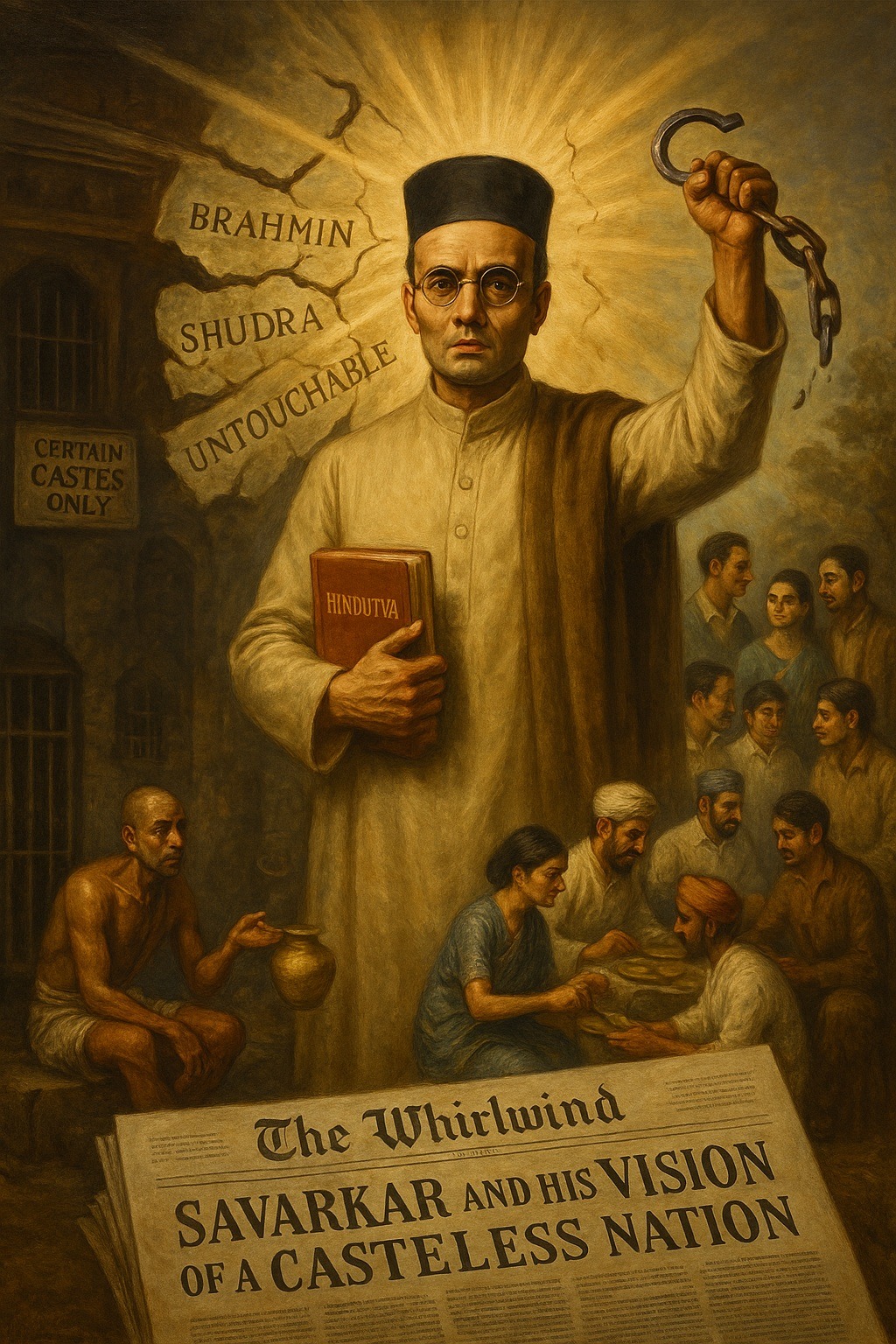Social-Reformist Dimension of Hindutva, Part 8
The caste system has long been a subject of intense debate. While some have seen it as a stabilizing force in Indian society, others have condemned it as an oppressive and regressive institution. Vinayak Damodar Savarkar, a prominent Indian nationalist, falls squarely into the latter camp. His critique of the caste system was sharp, rooted in both historical understanding and a forward-looking vision for Indian society.
The Debate on Caste: Contrasting Views
Throughout history, scholars and thinkers have had widely differing opinions on the caste system. Egalitarian and humanitarian voices, such as Sir Henry Maine and Rabindranath Tagore, have dismissed it as a disaster for social progress. Joseph Chailley even argued that caste prevents the development of a functioning social life in India. In contrast, figures like Sir Monier Monier-Williams and Meredith Townsend saw value in the system, describing it as a form of social organization that provided stability and prevented societal chaos.
However, Savarkar took a firm stance against the caste system, rejecting its utility in modern India. For him, caste was not just a social structure but a serious impediment to national unity and progress.
Savarkar’s Rejection of the Caste System
Savarkar viewed the caste system as deeply harmful, both individually and collectively. His exposure to Western liberal thought reinforced his belief that rigid caste divisions were an obstacle to India’s progress. He saw caste as the primary cause of social injustice and as a system that fragmented Indian society into countless, isolated units.
His critique went beyond mere rejection—he actively campaigned against caste-based discrimination. He particularly opposed caste determined by birth, advocating instead for a merit-based system. In his view, caste-based restrictions on inter-dining, intermarriage, and professions had outlived their historical relevance and now served only to divide the people.
The Andaman Experience: A Turning Point
Savarkar’s imprisonment in the British penal colony on the Andaman Islands was a pivotal moment in his social philosophy. Observing the suffering of lower-caste prisoners, he realized the extent to which caste discrimination had dehumanized his fellow countrymen. His experience in the Andamans strengthened his resolve to eradicate casteism and build a united, equitable society.
A Call for Reform: Merit Over Birth
A central tenet of Savarkar’s philosophy was the idea that caste should be based on merit (Gunajat) rather than birth (Janmajat). He strongly opposed the idea that religious texts should justify caste divisions. Quoting the Bhagavad Gita, he highlighted that Krishna spoke of Varnas based on qualities and duties, not birth.
Savarkar argued that caste, in its original form, may have been a functional social structure, but over time, it had become a rigid and oppressive system manipulated by orthodox elements. He compared casteism to the Luddite resistance to technological progress—a regressive force blocking necessary change.
The Fight Against Caste-Based Discrimination
Savarkar’s activism went beyond rhetoric. He launched campaigns to remove caste barriers, advocating for equal social opportunities, inter-caste marriage, and a restructured division of labor based on skill rather than birthright. He saw the caste system as a major reason why many lower-caste Hindus converted to other religions. In his view, caste-based discrimination led to a “mental bankruptcy” that weakened Hindu society from within.
He was also critical of high-caste Hindus who perpetuated caste-based inequalities for their own selfish gains. For Savarkar, true patriotism demanded the abolition of caste discrimination and the creation of an egalitarian, meritocratic society.
The Vision of a Casteless Hindu Society
Savarkar envisioned an India where caste divisions would be erased in favor of a unified national identity. His concept of “social brotherhood” was rooted in secular and rational principles, emphasizing national unity over religious or caste-based differences. He sought to dismantle not just the caste system but also the dogmatic and superstitious beliefs that sustained it.
According to Savarkar, the first step toward an integrated and homogeneous society was to expel the influence of religious texts that perpetuated caste divisions. Instead, he proposed a singular, national identity based on shared cultural and historical heritage, where every individual’s worth was determined by their contributions rather than their lineage.
Final Thoughts: The Legacy of Savarkar’s Social Reform
Savarkar’s critique of the caste system was revolutionary for his time. He saw caste as a divisive force that had outlived its utility and become a barrier to India’s progress. His call for a merit-based system and his efforts to promote social unity remain relevant even today.
His vision was not merely about social equality—it was about national strength. A casteless Hindu society, in his view, was essential for India’s emergence as a strong, independent nation. Though his views remain controversial, his role as a social reformer cannot be denied. Savarkar’s fight against caste discrimination was a crucial part of his broader vision for a unified and self-reliant India.
His work challenges us to continue striving for an India where merit triumphs over birth, and unity replaces division.
What are your thoughts on Savarkar’s notion of Caste and the Caste System? Share your insights in the comments below!
Sources:
GODBOLE, Vasudev Shankar. 2004. Rationalism of Veer Savarkar. Itihas Patrika Prashan: Thane/Mumbai.
Keer, Dhananjay. 1988. Veer Savarkar. Third Edition. (Second Edition: 1966). Popular Prakashan: Bombay (Mumbai).
SAMPATH, Vikram. 2019. Savarkar (Part 1). Echoes from a forgotten past. 1883-1924. Penguin Random House India: Gurgaon.
Vaidya, Prem. 1997. Memorable Documentary on Revolutionary Freedom Fighter Veer Savarkar. Veer Savarkar Prakashan: Mumbai.


Leave a Reply